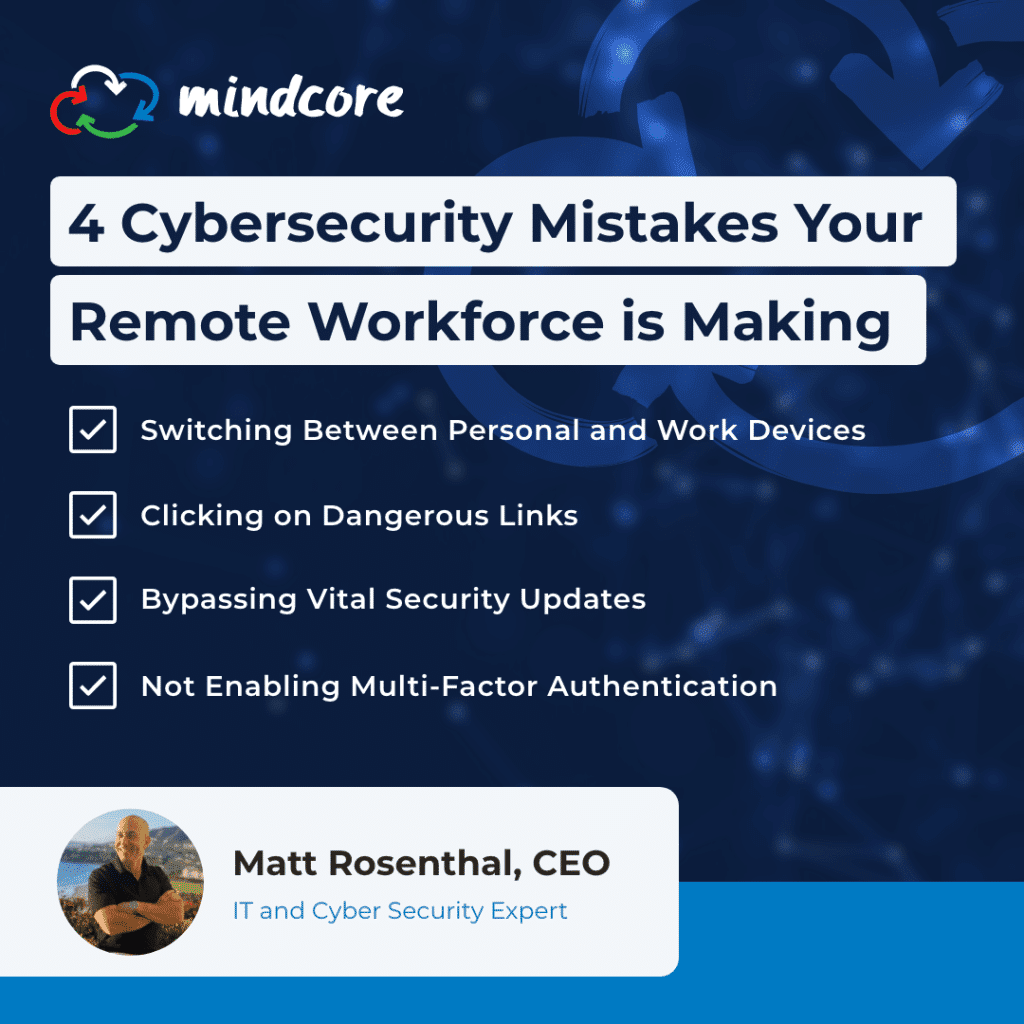
Since the start of the Covid-19 pandemic, remote work has become the new normal for many businesses. Working from home has been on the rise for the past few years, but organizations were pushed to start embracing it in March 2020. Both small businesses and large enterprises have discovered ways to solve issues like remote collaboration and a lack of equipment.
However, remote work brings a new set of cyber security challenges. A study by IBM found that human error is the main cause of 95% of security breaches. Employee training is vital to ensure that your remote policies and procedures are followed closely. Here are four cyber security employee mistakes to look out for as remote work continues to grow.
1. Switching Between Personal and Work Devices
Remote work can blur the lines between business and personal life. Your employees could easily slip into bad cyber security habits, such as using personal devices for work tasks and vice versa. Business data is more likely to be compromised on a personal laptop or mobile device — especially if people outside your company are using it. With no IT supervision, they can unknowingly install malware. Implementing cloud-based solutions for communication and file storage can ensure your employees are protected, and data-loss prevention tools will add an extra layer of security to their personal devices.
2. Clicking on Dangerous Links
Phishing emails have spiked in the work from home setting. Cybercriminals are taking advantage of the Covid-19 pandemic by impersonating emails from the World Health Organisation (WHO), capitalizing on people’s fears to get them to click on a dangerous link that can spread private company and personal information. Empowering your employees to spot the signs of a suspicious email, file, or link will help strengthen your first line of defense.
You can educate your employees in many ways, including mandatory training classes or stimulating a phishing attack through a tool. However, one of the best methods is to hire a managed IT services provider, such as Mindcore, to set up the best cyber security defense.
3. Bypassing Vital Security Updates
Many people see software updates as a nuisance. However, software updates recognize vulnerabilities in your security and help safeguard your data. Updates to your operating systems and software help keep cybercriminals and hackers out. Educating and ensuring your employees are regularly updating their software is crucial to help them understand the importance of security patching. There are also various tools businesses can use to make users update their devices regularly.
4. Not Enabling Multi-Factor Authentication
Using strong and secure passwords is necessary to protect your computer’s network. This is often overlooked or even put aside for most employees as something “to do later.” By setting up multi-factor authentication (MFA), the risk of passwords being compromised can be mitigated. MFA requires a user to provide at least two pieces of identification to gain access to a system. Rather than just asking for a username and password, MFA is based on one of three main types of additional information: things you know, things you have, and things you are. In the event there is suspicious activity, such as an employee receiving an approval request despite not logging into their account, they can send this to your IT team to investigate and stop potential hackers in their tracks.
Cyber Security Experts in NJ & FL
Mindcore provides companies in New Jersey and Florida with cyber security services to help protect your computer systems, networks, devices, and data from the latest attacks. We will create a personalized defense strategy that includes network monitoring, penetration testing, and more to make your business more secure and productive. For more information, schedule a consultation with a member of our team today.

